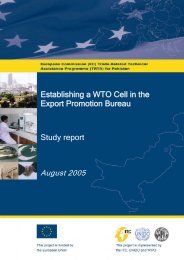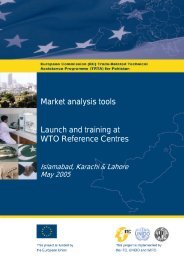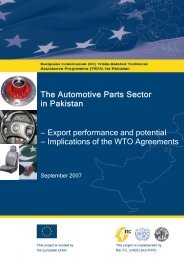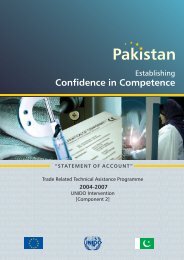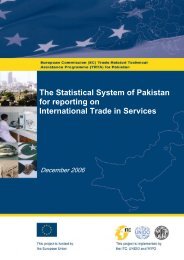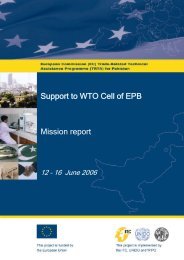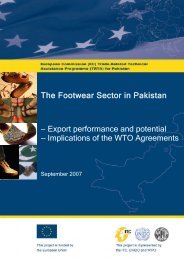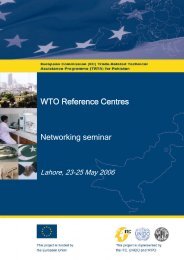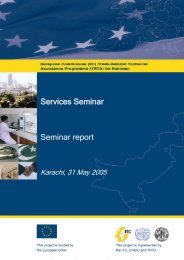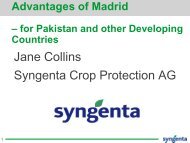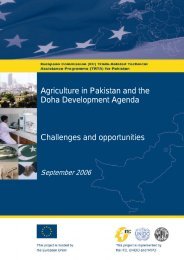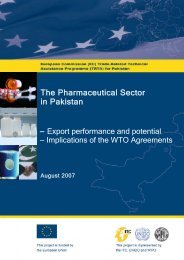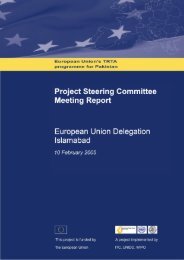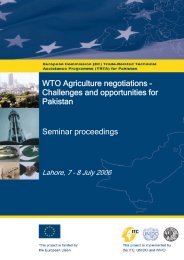The Furniture Sector in Pakistan: Export performance and ... - TRTA i
The Furniture Sector in Pakistan: Export performance and ... - TRTA i
The Furniture Sector in Pakistan: Export performance and ... - TRTA i
Create successful ePaper yourself
Turn your PDF publications into a flip-book with our unique Google optimized e-Paper software.
Agreement on the application of sanitary <strong>and</strong> phytosanitary measures<br />
(SPS)<br />
Member countries of the WTO are allowed under Article XX of the GATT 94 to regulate<br />
trade with a view to protect<strong>in</strong>g human, animal or plant life or health. Under the Agreement on<br />
Sanitary <strong>and</strong> Phytosanitary measures (SPS), the WTO has discipl<strong>in</strong>ed the exercise of discretion<br />
by member countries by disallow<strong>in</strong>g them to discrim<strong>in</strong>ate or misuse this authority serv<strong>in</strong>g as a<br />
form of disguised protectionism.<br />
Members of the WTO are allowed to establish their own st<strong>and</strong>ards but it is stipulated that the<br />
relevant regulations must be based on science <strong>and</strong> applied only to the extent necessary to<br />
protect human, animal or plant life or health. <strong>The</strong>y are not allowed to arbitrarily or<br />
unjustifiably discrim<strong>in</strong>ate between countries, where identical or similar conditions prevail.<br />
Member countries are encouraged to use <strong>in</strong>ternational st<strong>and</strong>ards, guidel<strong>in</strong>es <strong>and</strong><br />
recommendations if these are available.<br />
In order to make the process fair from the perspective of exporters, st<strong>and</strong>ards different from<br />
those already prescribed, can be applied. Similarly, different methods of <strong>in</strong>spect<strong>in</strong>g products<br />
can be adopted. In order to make this happen exporters demonstrate that the measures which<br />
export<strong>in</strong>g countries have applied are at the same level of “health protection” as adopted by<br />
import<strong>in</strong>g countries. Once that is done, an import<strong>in</strong>g country is expected to accept the<br />
export<strong>in</strong>g country’s st<strong>and</strong>ards <strong>and</strong> methods. <strong>The</strong> Agreement also lays down that governments<br />
must provide advance notice of new or changed SPS regulations. <strong>The</strong>y are also required to set<br />
a national enquiry po<strong>in</strong>t to provide up-to-date <strong>in</strong>formation.<br />
Relevance for the furniture sector<br />
Apparently, this agreement should not be relevant for the furniture sector. However,<br />
protectionist’s <strong>in</strong>terests can assume any garb <strong>and</strong> come up with objections as to the imported<br />
furniture on the ground of it be<strong>in</strong>g harmful to human, animal or plant health. In particular,<br />
such a st<strong>and</strong> can be taken somewhat easily <strong>in</strong> respect of the components of furniture <strong>and</strong> ready<br />
to assemble parts. It may be argued, for example, that <strong>in</strong>puts or polish on the furniture are<br />
emitt<strong>in</strong>g certa<strong>in</strong> substance or the wood used have been treated with a material (say anti-termite<br />
treatment carried out by the manufacturer) which is harmful to the human, animal <strong>and</strong> plant<br />
life. In such a situation, it would be open for our exporters to approach the Government of<br />
<strong>Pakistan</strong> (GOP) to press <strong>in</strong>to service provisions <strong>in</strong> the agreement aga<strong>in</strong>st untenable st<strong>and</strong>ards.<br />
(Action: <strong>Furniture</strong> Industry <strong>and</strong> GOP)<br />
Customs Valuation under the GATT – Implementation of Article VII of<br />
the GATT<br />
<strong>The</strong> Provisions regard<strong>in</strong>g customs valuation under the GATT seek to establish a fair <strong>and</strong><br />
uniform system for the valuation of goods that provides protection to <strong>in</strong>ternational traders from<br />
fixation of arbitrary values by customs authorities of import<strong>in</strong>g countries. <strong>The</strong> agreement lays<br />
down that the customs value of the imported goods <strong>in</strong> the case of unrelated parties (additional<br />
considerations apply where the importer <strong>and</strong> exporter are related entities) will be the<br />
“transaction value”, which really means the price actually payable for the goods when sold for<br />
exports. Some costs such as: freight, packag<strong>in</strong>g, commissions etc. may be added for the<br />
purpose of work<strong>in</strong>g out customs value. <strong>The</strong> agreement however excludes items that are<br />
regarded irrelevant for fix<strong>in</strong>g custom value, e.g. the price of goods <strong>in</strong> domestic market of the<br />
International Trade Centre 65



